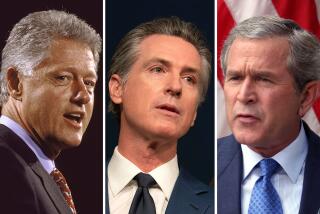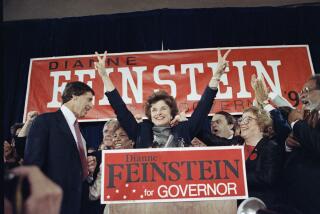Panetta Stands at Junction in Heralded Career
WASHINGTON — When Leon E. Panetta became Bill Clinton’s chief of staff in 1994, he found a president whose time was wasted in pointless meetings, a staff with no clear chain of command, a White House that literally had no organization chart.
“People were just walking in [to the Oval Office] and doing meetings,” Panetta recalled. “You would have free-for-alls in there, and it was consuming [Clinton’s] time.”
“You’ve got to put some order in the place,” Clinton told him.
So Panetta cracked down. He canceled the “walk-in” rights of dozens of officials, stopped uninvited aides from attending presidential meetings and demanded that decisions come to his desk first. He even found himself admonishing Clinton on how to do the job of a president.
“You’ve got to keep focused,” he recalled telling Clinton as the president raged over press coverage of his administration’s troubles. “You can’t take the headlines of the day and let them consume you. . . . You’ve got to keep your eye on the goal.”
“It was not an easy transition,” Panetta said in a recent interview in the West Wing office he was preparing to vacate. But Clinton “understood that he was better for it. . . . He’s beginning to see the rewards from that now.”
Panetta, who brought an unusual combination of experience as both a congressman and an executive branch official to his job, is going home to Carmel Valley on the Monterey Peninsula to contemplate running for governor.
In Democratic circles in California, the question is whether this consummate insider--”respected and even beloved here in Washington but much less well known among average voters,” in the words of his friend Rep. Howard L. Berman (D-Sherman Oaks)--has a serious chance in a statewide primary.
But in Washington, the question is whether Panetta’s successor, North Carolina businessman Erskine Bowles, can do as well at advancing Clinton’s political agenda, especially on Capitol Hill.
“It’s hard to imagine the new chief of staff will be the same kind of chief congressional liaison that Leon was,” Berman said.
Panetta, the son of an Italian immigrant walnut farmer, began his political life as a liberal Republican but became a Democrat after he was fired from a mid-level job in the administration of President Nixon. Panetta wanted to put the federal government’s weight behind efforts to desegregate public schools in the South; Nixon disagreed.
As a Democrat, Panetta represented the Monterey area in Congress for 16 years and became one of his party’s leading “deficit hawks,” serving as chairman of the House Budget Committee.
In 1993, Clinton tapped him as chief of the Office of Management and Budget, and Panetta helped forge the new administration’s deficit reduction proposals--cutting traditional Democratic domestic programs in the process.
As OMB chief, Panetta was outspoken about disorganization and lack of focus in the White House. At one point, to Clinton’s distress, he bluntly told reporters that the president was trying to do too many things at once and risked losing them all.
So when Clinton decided that he needed a new chief of staff to replace his boyhood friend Thomas F. “Mack” McLarty, he turned to Panetta--to see if he could deliver.
Ironically, other aides said, Panetta turned out to be an indifferent administrator on his own. “You could take problems to Leon and he’d listen and smile, but nothing would happen,” one said.
Instead, it was Bowles, Panetta’s deputy, who proposed the new businesslike procedures that made the White House work. But Panetta enforced the new rules, the aides said.
Panetta also concentrated on the “focus” side of the problem--keeping Clinton and his staff channeled toward one or two priorities at a time.
For much of 1995 and 1996, as Clinton sought to recover from a series of defeats that culminated in the Democrats’ loss of Congress in 1994, the main battle was over the federal budget--Panetta’s acknowledged zone of expertise.
The chief of staff led the Democrats’ charge against Republican budget proposals. He once accused the GOP of favoring “a Grey Poupon budget that basically helps people in limousines and cuts everyone else.”
But he still managed to reach out to his former GOP colleagues in Congress and helped to negotiate a budget compromise. Clinton recently presented Panetta with an autographed copy of last year’s omnibus budget legislation, calling it a representation of the chief of staff’s “finest hour.”
Inside the White House, aides said, Panetta filled two more essential roles: He made Clinton laugh, and he told Clinton no.
“Leon has been the guy who has to bring the president bad news,” White House spokesman Mike McCurry noted. Recently, for example, Panetta had to walk into the Oval Office to tell Clinton that Paula Corbin Jones, the Arkansas woman who has accused him of making a sexual advance several years ago, was on the cover of Newsweek.
“But he’s the right one to do that because he’s so good at keeping [Clinton’s] spirits up,” McCurry said.
Sometimes Panetta even resorted to stunts. He once saluted Clinton’s birthday by riding a horse--borrowed from the National Park Service--onto the White House grounds as the theme from “Bonanza” played through a loudspeaker.
Panetta’s job included saying no to bad ideas. In 1995, when Clinton political advisor Dick Morris proposed busting the federal limits on campaign spending, “Panetta put his body in front of the train,” McCurry said.
Panetta’s tenure was not problem-free. He waged a long struggle with Morris, who insisted on reporting directly to the president. (Morris won but later resigned after a tabloid reported he had entertained a prostitute by reading to her from confidential drafts of Clinton’s speeches.)
Panetta also had deep qualms about Clinton’s decision to sign last year’s Republican-authored welfare reform bill. Indeed, despite his stature as a deficit hawk, the Californian was also one of the most powerful liberals in Clinton’s inner circle.
“The president’s view was [that] it was the one chance he had to basically change the existing system,” Panetta said. “That’s where he was coming from. And I respect that.”
Still, he added, “I don’t like to roll dice with the lives of people.
“First and foremost, we have got to provide the jobs” for people coming off welfare. “This is going to be, in the end, one of the great tests of the president’s legacy: whether or not he can get rid of a welfare program that nobody thought was working well . . . and really produce the kind of jobs and opportunity that are needed.”
Panetta’s last few weeks have been filled with tributes. Clinton declared: “He is my paisan [Italian for comrade], and I love him very much.” The House Democratic caucus gave him a standing ovation.
After 20 years working in Washington, Panetta said, “I want to go back to California. I want to go home.”
He’ll spend a few weeks relaxing with his family in Carmel Valley and talking with friends and supporters about whether he should run for governor, he said.
Then he’ll do some traveling around the state, speaking at colleges and meeting with Democrats.
“My Italian immigrant parents really did say that you have to give something back to the country,” he said. “I really do believe in public service. I’ve done that most of my life. I’m not leaving my commitment to work on the issues that I care about.”
Panetta said Clinton, a former Arkansas governor, has encouraged him to consider the gubernatorial race. But whether Panetta decides to try for the governor’s mansion may depend on whom the competition turns out to be. Sen. Dianne Feinstein (D-Calif.), Lt. Gov. Gray Davis, state Controller Kathleen Connell and Northwest Airlines Co-Chairman Alfred A. Checchi have all expressed interest in the Democratic nomination.
Polls suggest that Feinstein would be the favorite if she decides to run. Feinstein and Panetta have quietly discussed the race in recent weeks and have agreed that neither wants a bloody primary battle. They say, however, that no deals have been made.
Meanwhile, Panetta is not leaving Washington altogether. He said he expects to get occasional calls from Clinton--at all hours of the day and night. And he conceded that if Feinstein’s Senate seat were ever to come open, “I haven’t excluded that possibility here.”
“I’ll maintain my apartment here,” he said.
More to Read
Get the L.A. Times Politics newsletter
Deeply reported insights into legislation, politics and policy from Sacramento, Washington and beyond. In your inbox three times per week.
You may occasionally receive promotional content from the Los Angeles Times.











